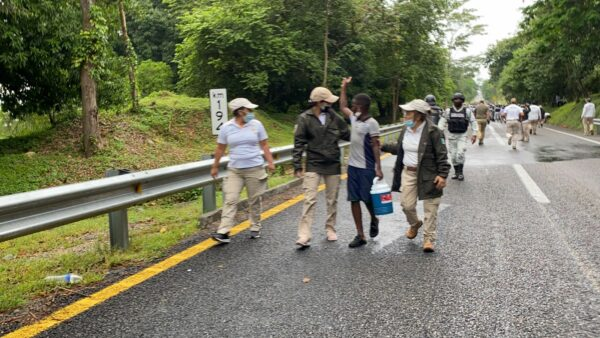
The United Nations High Commissioner for Refugees (UNHCR) published the Protection Monitoring Report in Mexico 2023 “The Impact of Forced Displacement on Human Mobility”, a document on the protection needs of the mobile population in Chiapas and Mexico.
In 2023, UNHCR and civil society organizations conducted 6,387 interviews that collected information from 15,000 people of different nationalities in Tapachula, Suchiate, Tenosique, Villahermosa (southern region); Ciudad Acuña, Ciudad Juárez, Matamoros, Mexicali, Monterrey, Nogales, Piedras Negras, Reynosa, Saltillo and Tijuana (northern region) and Mexico City, Aguascalientes, Guadalajara, Querétaro, Celaya, León, Irapuato and San Luis Potosí (central region).
Just over half of the people surveyed (51%) indicated violence, insecurity and threats as the main reasons why they have left their country of origin. More than half of the women mentioned having been victims of violence and direct threats as the main reason for fleeing.
By nationality, 71% of Haitians indicated fear of the general situation of violence as the reason for leaving; 69% of Hondurans reported having been victims of violence, threats and intimidation and 51% of Venezuelans mentioned violence, insecurity, threats and insecurity as causes of departure. 67% of Colombians, 64% of Ecuadorians and 55% of Nicaraguans reported violence, insecurity and threats as the main causes of departure.
This data reinforces the possibility that the majority of people who enter Mexico irregularly could have international protection needs, therefore, asylum systems and fair and efficient procedures must be strengthened, UNHCR stated.
The High Commissioner explained that 66% of the people surveyed said that their life, safety or freedom would be in danger if they were returned to their country of origin, of which 54% mentioned that they would face direct threats.
For this reason, it is important to identify the international protection needs of people on the move to prevent them from being returned to their country. Otherwise, the principle of non-refoulement, a cornerstone of international refugee law, would be violated, he said.
Furthermore, 55% of the people surveyed traveled in families, 22% traveled in single-parent families.
A third of the people surveyed had specific protection needs, being single mothers or caregivers, survivors of abuse, people with chronic medical conditions, pregnant or lactating women, people with disabilities and older adults.
The report gives an account of the risks to which people are exposed when arriving in Mexico and while transiting through the country.
Upon arrival, one in three families needs accommodation support and one in ten is at risk of spending the night on the street. One in three people did not have any documents issued by Mexican authorities, exacerbating vulnerability to protection risks such as robbery, extortion, and physical threats or intimidation.
Of the people surveyed, 63% said that their destination country was the United States, 26% indicated that it was Mexico. 72% reported having requested an appointment to appear in the US with the CBP One application.
Between June and December, 139 cases (207 people) of different nationalities deported to Mexico from the US were detected.
Therefore, the High Commissioner pointed out the operation of monitoring as a document with the collection, verification and analysis of information in a systematic and regular manner to identify violations of rights and protection risks for people on the move and inform effective responses.
Text and photos: Andrés Domínguez.
Original article at Chiapas Paralalo on March 19th, 2024.
Translated by Schools for Chiapas
